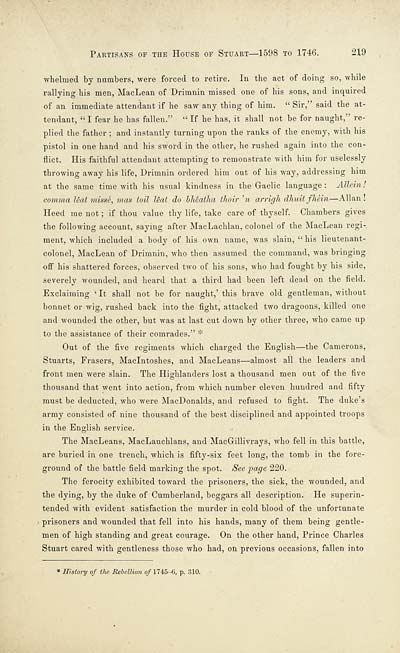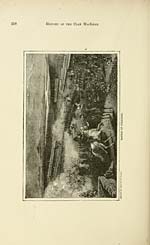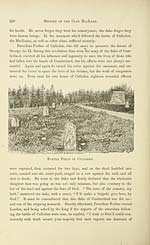History of the Clan MacLean from its first settlement at Duard Castle, in the Isle of Mull, to the present period
(225) Page 219
Download files
Complete book:
Individual page:
Thumbnail gallery: Grid view | List view

Partisans of the House of Stuakt — 1598 to 1746. 219
whelmed by numbers, were forced to retire. In the cact of doing so, while
rallying his men, MacLean of Drimnin missed one of his sons, and inquired
of an immediate attendant if he saw any thing of him. " Sir," said the at-
tendant, " I fear he has fallen." " If he has, it shall not be for naught," re-
plied the father ; and instantly turning upon the ranks of the enemy, with his
pistol in one hand and his sword in the other, he rushed again into the con-
flict. His faithful attendant attempting to remonstrate with him for uselessly
throwing away his life, Drimnin ordered him out of his way, addressing him
at the same time with his usual kindness in the Gaelic language: Allein!
comma Uat inisse, mas toil Uat do hMatha thoir '» arrigh dhuitfhein — Allan!
Heed me not ; if thou value thy life, take care of thyself. Chambers gives
the following account, saying after MacLachlan, colonel of the MacLean regi-
ment, Avhich included a body of his own name, was slain, " his lieutenant-
colonel, MacLean of Drimnin, who then assumed the command, was bringing
■off his shattered forces, observed two of his sons, who had fought by his side,
severely wounded, and heard that a third had been left dead on the field.
Exclaiming ' It shall not be for naught,' this brave old gentleman, without
bonnet or wig, rushed back into the fight, attacked two dragoons, killed one
and wounded the other, but was at last cut down by other three, who came up
to the assistance of their comrades." *
Out of the five regiments which charged the English — the Camerons,
Stuarts, Frasei-s, Macintoshes, and MacLeans — almost all the leaders and
front men were slain. The Highlanders lost a thousand men out of the five
thousand that went into action, from which number eleven hundred and fifty
must be deducted, who were MacDonalds, and refused to fight. The duke's
army consisted of nine thousand of the best disciplined and appointed troops
in the English service.
The MacLeans, MacLauchlans, and MacGillivrays, who fell in this battle,
are buried in one trench, which is fifty-six feet long, the tomb in the fore-
ground of the battle field marking the spot. See page 220.
The ferocity exhibited toward the prisoners, the sick, the wounded, and
the dying, by the duke of Cumberland, beggars all description. He superin-
tended with evident satisfaction the murder in cold blood of the unfortunate
prisoners and wounded that fell into his hands, many of them being gentle-
men of high standing and great courage. On the other hand. Prince Charles
Stuart cared with gentleness those who had, on previous occasions, fallen into
* Histo7-y oj the Rebellion of 1745-6, p. 310.
whelmed by numbers, were forced to retire. In the cact of doing so, while
rallying his men, MacLean of Drimnin missed one of his sons, and inquired
of an immediate attendant if he saw any thing of him. " Sir," said the at-
tendant, " I fear he has fallen." " If he has, it shall not be for naught," re-
plied the father ; and instantly turning upon the ranks of the enemy, with his
pistol in one hand and his sword in the other, he rushed again into the con-
flict. His faithful attendant attempting to remonstrate with him for uselessly
throwing away his life, Drimnin ordered him out of his way, addressing him
at the same time with his usual kindness in the Gaelic language: Allein!
comma Uat inisse, mas toil Uat do hMatha thoir '» arrigh dhuitfhein — Allan!
Heed me not ; if thou value thy life, take care of thyself. Chambers gives
the following account, saying after MacLachlan, colonel of the MacLean regi-
ment, Avhich included a body of his own name, was slain, " his lieutenant-
colonel, MacLean of Drimnin, who then assumed the command, was bringing
■off his shattered forces, observed two of his sons, who had fought by his side,
severely wounded, and heard that a third had been left dead on the field.
Exclaiming ' It shall not be for naught,' this brave old gentleman, without
bonnet or wig, rushed back into the fight, attacked two dragoons, killed one
and wounded the other, but was at last cut down by other three, who came up
to the assistance of their comrades." *
Out of the five regiments which charged the English — the Camerons,
Stuarts, Frasei-s, Macintoshes, and MacLeans — almost all the leaders and
front men were slain. The Highlanders lost a thousand men out of the five
thousand that went into action, from which number eleven hundred and fifty
must be deducted, who were MacDonalds, and refused to fight. The duke's
army consisted of nine thousand of the best disciplined and appointed troops
in the English service.
The MacLeans, MacLauchlans, and MacGillivrays, who fell in this battle,
are buried in one trench, which is fifty-six feet long, the tomb in the fore-
ground of the battle field marking the spot. See page 220.
The ferocity exhibited toward the prisoners, the sick, the wounded, and
the dying, by the duke of Cumberland, beggars all description. He superin-
tended with evident satisfaction the murder in cold blood of the unfortunate
prisoners and wounded that fell into his hands, many of them being gentle-
men of high standing and great courage. On the other hand. Prince Charles
Stuart cared with gentleness those who had, on previous occasions, fallen into
* Histo7-y oj the Rebellion of 1745-6, p. 310.
Set display mode to:
![]() Universal Viewer |
Universal Viewer | ![]() Mirador |
Large image | Transcription
Mirador |
Large image | Transcription
Images and transcriptions on this page, including medium image downloads, may be used under the Creative Commons Attribution 4.0 International Licence unless otherwise stated. ![]()
| Histories of Scottish families > History of the Clan MacLean from its first settlement at Duard Castle, in the Isle of Mull, to the present period > (225) Page 219 |
|---|
| Permanent URL | https://digital.nls.uk/94804586 |
|---|
| Description | A selection of almost 400 printed items relating to the history of Scottish families, mostly dating from the 19th and early 20th centuries. Includes memoirs, genealogies and clan histories, with a few produced by emigrant families. The earliest family history goes back to AD 916. |
|---|

